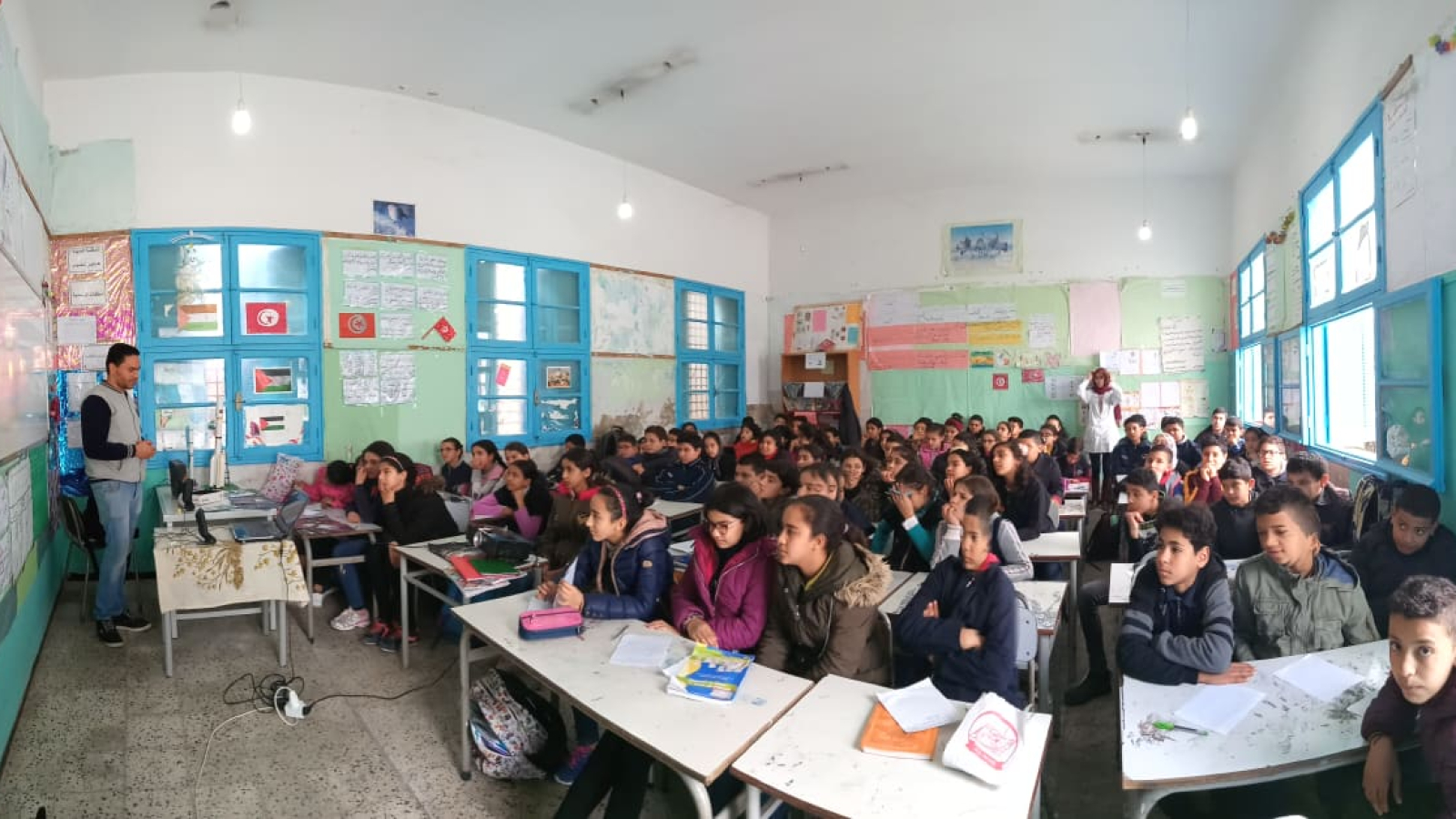Education and Social Work in Schools
Tunisia’s education system has historically been a cornerstone of its socio-economic progress, reflecting its commitment to human capital development. However, as the world evolves, so do the challenges faced by the system. Despite achievements in literacy and access to education, stark disparities persist between urban and rural areas, alongside issues of curriculum relevance, teacher capacity, and early school dropouts.
Schools are more than just places of learning—they are key drivers of social development, preparing students for life and equipping them with tools to succeed academically, socially, and emotionally. However, many students face challenges that hinder their growth, from behavioral maladaptation to socio-economic barriers. These issues, if left unaddressed, can lead to dropout rates, academic underachievement, and social exclusion.
In Tunisia, integrating social work into schools has proven to be an innovative and necessary solution to these challenges. This approach not only addresses the immediate needs of students but also contributes to long-term social cohesion and educational equity. By aligning with global and national standards, Tunisia’s school-based social work initiatives serve as a model for enhancing educational environments.
THE RAISON D’ÊTRE:
Why Education Needs Reform
Education is central to Tunisia’s aspirations for socio-economic equality and sustainable development. Schools are not only institutions of learning but also pivotal spaces where the next generation acquires the skills, values, and resilience needed to thrive in an increasingly complex world.
However, Tunisia faces systemic barriers:

Early Dropouts: Over 100,000 students drop out annually, with many citing economic hardship, long commutes, and perceived irrelevance of education to future prospects.
Regional Inequities: Educational resources and infrastructure remain concentrated in urban areas, while rural schools lack essential facilities and qualified staff.
Skills Mismatch: The current curriculum emphasizes rote learning over critical thinking and innovation, leaving graduates ill-prepared for the labor market.
Why Social Work in Schools Is Vital
The increasing complexity of challenges faced by students demands specialized interventions. The primary objectives of social work in schools are:
- Mitigating Social Maladaptation: Students often experience maladaptation due to family instability, poverty, or behavioral challenges. Social work provides targeted support to reintegrate them into positive social and academic pathways.
- Reducing Dropout Rates: One of the key drivers of school-based social work is to identify students at risk of dropping out and implement personalized interventions to keep them engaged in education.
- Promoting Equity and Inclusion: By providing tailored resources and assistance, social workers ensure that marginalized students—those from underprivileged or vulnerable backgrounds—are not left behind.
- Creating Supportive Environments: Schools serve as community hubs, and social work helps bridge the gap between students, families, and external resources to foster a nurturing environment.
These goals reflect the broader vision of educational reform, aiming to make schools inclusive, equitable, and supportive spaces for all learners.
Key Interventions: How Social Work is Changing the Game
Tunisia’s school-based social work programs are built on practical, impactful interventions:
- Early Identification and Intervention: Social workers conduct assessments to identify students experiencing difficulties, such as behavioral issues, academic struggles, or family-related stress. Timely intervention helps mitigate long-term negative outcomes.
- Community Collaboration: Partnerships with local organizations, psychologists, and educators create a holistic support network, addressing not only students’ academic needs but also their emotional and social well-being.
- Tailored Support Plans: Individualized programs are developed to address specific challenges faced by students, whether it’s providing tutoring, counseling, or connecting families with social services.
- Capacity Building for Schools: Social workers train teachers and staff to recognize signs of distress in students and implement classroom strategies that promote inclusion and positive behavior.
These interventions are supported by structured policies and frameworks, which ensure that social work programs are aligned with broader educational goals and international standards.
CHALLENGES
Challenges to the Education System
1. Regional Disparities
The divide between urban and rural areas is stark. In underserved regions such as Kasserine and Tataouine, schools often operate with overcrowded classrooms, insufficient learning materials, and inadequate infrastructure, including the absence of libraries and laboratories.
2. High Dropout Rates
Dropout rates remain alarmingly high, particularly among rural girls and children from low-income families. Early marriages and socio-economic pressures further exacerbate this trend, reinforcing cycles of poverty and inequality.
3. Outdated Curriculum
Tunisia’s education system heavily emphasizes memorization over practical, problem-solving skills. This approach not only fails to engage students but also leaves them unprepared for modern industries, particularly in the fields of technology, entrepreneurship, and sustainability.
4. Teacher Training and Support
Many teachers lack access to ongoing professional development. As a result, teaching methodologies often do not reflect modern pedagogical practices, impacting the quality of education delivered, especially in STEM and vocational training.
Barriers to Effective Implementation
While Tunisia’s initiatives have shown promise, several challenges remain:
- Resource Constraints: Insufficient funding and staffing levels limit the reach of social work programs, leaving many schools underserved.
- Standardization Issues: A lack of uniform practices across schools leads to inconsistencies in the delivery of social services.
- Training Gaps: Many social workers and educators require additional training to address the evolving needs of students effectively.
- Data and Monitoring: The absence of robust data systems to track interventions and measure outcomes hinders evidence-based decision-making and program improvements.
RECOMMENDATIONS:
- A Roadmap for Educational Transformation
Tunisia’s education system requires a comprehensive, multi-faceted approach to reform. Below are actionable strategies inspired by local context and global best practices:
Policy and Investment
- Prioritize Underserved Regions: Allocate increased funding to rural schools to improve infrastructure, provide learning materials, and recruit qualified teachers.
- Revise Curricula: Shift the focus from memorization to critical thinking, creativity, and entrepreneurship. Integrate STEM and digital literacy into all levels of education.
- Expand Vocational Training: Align vocational programs with market needs, partnering with industries to create meaningful pathways for students.
Community and School-Level Interventions
- Parent Engagement Programs: Educate families on the value of education, offering financial and logistical support to encourage attendance.
- School-Community Partnerships: Leverage partnerships with local organizations and businesses to create enrichment programs, after-school tutoring, and internships.
Technology Integration
- Digital Learning Platforms: Equip schools with technology that enables students to access e-learning resources, especially in rural areas with teacher shortages.
- EdTech Innovation: Introduce adaptive learning platforms that cater to individual student needs, bridging gaps in comprehension and engagement.
Teacher Development
- Comprehensive Training: Provide continuous professional development, focusing on innovative teaching methods and inclusive practices.
- Incentives for Rural Teachers: Offer financial and professional incentives to attract skilled educators to underserved regions.
II. A Roadmap for Impactful school-based social work
To maximize the potential of school-based social work, the following steps are recommended:
- Increase Investment in Social Work: Allocate more resources to hire and train social workers, ensuring every school has access to these services.
- Develop Standardized Frameworks: Establish clear guidelines and best practices for social work in schools, ensuring consistency and effectiveness across all institutions.
- Enhance Training Programs: Provide ongoing professional development for social workers and educators, equipping them with the tools to handle diverse and complex student needs.
- Strengthen Community Partnerships: Foster collaborations between schools, local organizations, and government agencies to create comprehensive support networks.
- Implement Robust Monitoring Systems: Develop data-driven mechanisms to track the progress of interventions, evaluate outcomes, and refine programs based on evidence.
Conclusion: A Vision for Inclusive Education
Tunisia’s experience with integrating social work into schools highlights the transformative potential of these programs. By addressing social maladaptation, reducing dropout rates, and fostering inclusivity, school-based social work lays the foundation for a more equitable and resilient education system. However, sustained investment, standardized practices, and community collaboration are essential to overcoming existing challenges and ensuring long-term impact.
The integration of social work in schools is not just a solution to immediate challenges—it is an investment in the future of education and society. By prioritizing these efforts, we can create learning environments where every student has the opportunity to thrive.

